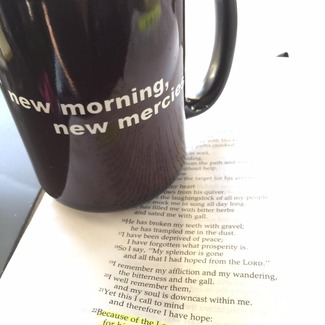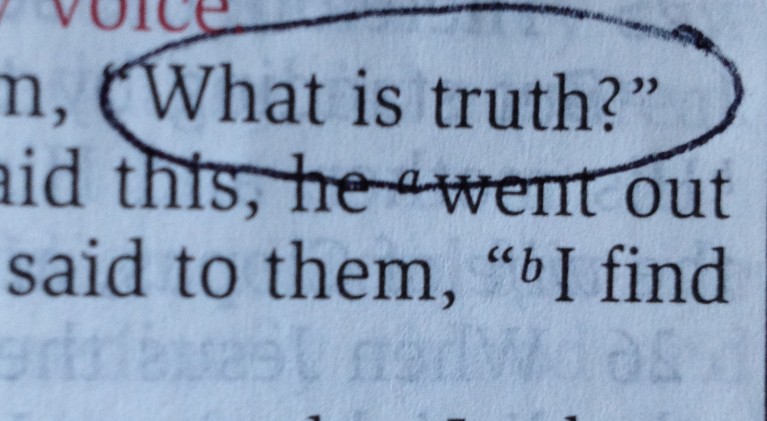His Fresh Mercy
 Wednesday, May 30, 2018 at 01:50PM
Wednesday, May 30, 2018 at 01:50PM  The steadfast love of the Lord never ceases;
The steadfast love of the Lord never ceases;
The Problem With Jesus
 Wednesday, May 16, 2018 at 08:49AM
Wednesday, May 16, 2018 at 08:49AM  “That’s the problem with Jesus,” said Simon the Zealot. “He doesn’t see the possibilities of all these people who are gathering around him.”
“That’s the problem with Jesus,” said Simon the Zealot. “He doesn’t see the possibilities of all these people who are gathering around him.”
“What bothers me about Jesus,” said Peter, changing the topic slightly, “is the way he keeps talking about getting himself killed. That’s never gonna happen—not on my watch!”
Just then Jesus returned to the fireside and took his seat. “So,” he said. “What were you guys talking about? . . .”
I’ll leave the rest of the fireside chat to your imagination. But I would like to talk about discipleship from the disciple’s point of view. What do you think it was like learning from a master like Jesus? It couldn’t have been easy. Keep in mind the disciples didn’t know exactly who they were dealing with. Nor did they know the end of the story. They were just a dozen men who had left everything behind to live and learn from this rabbi.
I’m sure those twelve men had more than one “the problem with Jesus” conversation. After all, Jesus gave them plenty of actions to criticize. Jesus told devout Jews they needed to eat his body and drink his blood. Jesus seemed to avoid the big crowds: just when his ministry looked like a success he would say, “Let’s go somewhere else.” Jesus tried to tell his friends (three times!) things are going to end badly in Jerusalem. Jesus insulted Pharisees and lawyers; he welcomed the most unsavory elements of society; he even talked to foreign women!
You can also factor in the stuff Jesus said about himself: “The Father loves the Son, and shows him all things that he himself is doing . . . Just as the Father raises the dead and gives them life, even so the Son gives life to whom he wishes . . . Not even the Father judges anyone, but he has given all judgment to the Son . . . all will honor the Son just as they honor the Father . . . he who does not honor the Son does not honor the Father who sent him.” What were the disciples to make such talk? Wouldn't these things sound delusional? And by the way, all these statements come from a single conversation! (John 5:19-24)
I think the disciples saw plenty of problems with Jesus. He was unpredictable; he seemed impulsive; he rarely spoke plainly—and when he did it was always disturbing. And yet they followed him. They responded to his call, and remained his disciples even when things were confusing, or even offensive.
But he’s Jesus, you might think. Of course the disciples stuck with him. Yet there are two problems with such thoughts. First, we see the end from the beginning; the disciples had no such advantage. Second, we are tempted to think we would have stuck with Jesus, too. Because Jesus is the perfect Son of God, we think we would’ve soaked up everything he said and did. Beware this line of thought. It doesn’t help us to say, “Today we are dealing with fallible human beings. Jesus was the sinless perfect Son of God.”
Here’s the question behind today’s post: how do we cope with the flaws of leadership? And not just leadership: but those who disciple us. We are more likely to see the flaws of someone who disciples us than of any other person. How are we to judge?
I’ll resist the urge to provide quick answers, because working through the problem is the path to life. But I will offer two final questions:
- Who disciples you? I’m not talking about church leadership, which is recognized by titles like pastor, deacon, or elder. Leadership is an organizational concept; discipleship is formational. Who helps shape and form your life?
- What about the flaws of the disciple-maker? This question cuts two ways because your mentor certainly has flaws. Everyone does. But how are we to tell the difference between “flaws” and those things we simply do not understand? Some actions or statements could look like arrogance or miscalculation—but they just might be correct and necessary. How are we to know?
Let’s leave the questions hanging. I have some ideas about them, but that’s a post for another day.
What is Truth?
 Friday, April 13, 2018 at 02:20PM
Friday, April 13, 2018 at 02:20PM  I think it’s wise to be skeptical when people talk about “the truth.” In this era (as in others) we are willing to kill for our ideas about truth. That’s why ideas about the truth are not enough. We cannot discover truth through argument. We must meet the truth and walk with him.
I think it’s wise to be skeptical when people talk about “the truth.” In this era (as in others) we are willing to kill for our ideas about truth. That’s why ideas about the truth are not enough. We cannot discover truth through argument. We must meet the truth and walk with him.
The truth is a pathway. Let me share with you some of the steps I found along the path. Although the road goes ever on, I’m encouraged to think I’m walking in the way. Here is part of my journey:
Nurture: Early childhood teaches us to order our world around our experience. These experiences become a kind of foundational truth for us, whether right or wrong. Later, God’s grace comes to either affirm or contradict these foundations. This is why raising children is a sacred trust from the Father: the truth children learn creates the ability to recognize the Way, Truth, and Life when we meet him later. What an awesome responsibility rests with us as parents: we can position our children to know the truth.
Obedience: To understand something we must stand under it. This is why obedience is central to discipleship. Humble and simple acts of obedience position us to walk in reality. Obedience aligns us with the true nature of creation and the ways of the Creator. Obedience is going with the ultimate flow. It is alignment with the deep nature of things—a discovery of the truth.
Discovery: Discovery is more than learning. If I am told the truth I might remember it. If I discover the truth I will never forget. The Father reveals truth by leading us to discovery. He hides the Easter eggs, careful to leave them where we can find them. He glories in concealing some things, and we become sons and daughters of the King as we search them out.
Love: Real love is the sure path to truth. But it is dangerous as well because we think we know what love is—but do we? Discovering the meaning of love is a lifelong task, and a worthy one. To be on the side of love is to be on God’s side, because God is love. To love is to see and do things God’s way. It never fails.
Jesus: The truth came into world and lived among us: “The word became flesh and made his dwelling among us . . . full of grace and truth.” Later in this rich gospel Thomas asked a silly question (the answer had been before him for three years): “Lord, how can we know the way?” Jesus answered, “I am the way and the truth and the life. No one comes to the Father except through me.” Like love, this a dangerous way because the challenge of “Jesus-as-truth” is our powerful tendency to re-create Jesus to our taste and preference: Jesus the Republican, Jesus the non-violent, Jesus the Socialist—or Jesus in any form that merely affirms our own view of the world. He is both the path and destination: we must keep walking. Knowing about Jesus is not enough. Even knowing the gospels is not enough—John’s gospel reminds us the world cannot hold all the books that could be written about him. But the human heart can.
Freely Received; Freely Given
 Saturday, April 7, 2018 at 03:50PM
Saturday, April 7, 2018 at 03:50PM  There’s only a small difference between the words, “Give what you have,” and “Give what you’ve received,” but it’s the difference between two kingdoms. Jesus commissioned his disciples on their very first assignment with these words:
There’s only a small difference between the words, “Give what you have,” and “Give what you’ve received,” but it’s the difference between two kingdoms. Jesus commissioned his disciples on their very first assignment with these words:
“As you go, proclaim this message: ‘The kingdom of heaven has come near.’ Heal the sick, raise the dead, cleanse those who have leprosy, drive out demons. Freely you have received; freely give.”
Pastors and church leaders have been big on the “go, proclaim” part of his instructions: so big, in fact, that in our haste we’ve sometimes failed to grasp his words, “Freely you have received; freely give.” One of the secrets to ministry lies in discovering what you have received before you rush off to give.
These words come from Matthew, chapter 10. It was the first time Jesus sent his disciples out into the field of ministry. Apparently, the Lord considered them prepared, or at least prepared enough to begin to put their lessons into practice. The disciples had left everything behind to follow Jesus: their businesses as fishermen, their roles as tax collectors, zealots, or whatever had occupied their time before they heard the call, “Come, follow me.”
The difference between giving what you have and giving what you’ve received is the difference between the kingdoms of this world and the Kingdom of the age to come. What the disciples received from Jesus was a new way of life. Consider these three points:
1). “Give what you have” focuses on our talents, our abilities, and our wealth. The starting point is what we have. We bring our not only our resources to the party but also our understanding, our methods and our values. A lifeless religion is filled with people working hard to serve God, bringing the sacrifice of their time, energy and money. A sign of the Kingdom is people who joyfully share what they’ve received.
The disciples listened in amazement when Jesus suggested that a rich young ruler should “sell everything you have . . . then come, follow me.” The logic of the world would suggest that a rich man is already poised to serve the King: he need only redirect his wealth toward God, as if God would benefit from the rich man’s deep pockets. I can imagine the rich young ruler walking away shaking his head, thinking, “Jesus missed the boat. I have a lot to offer.”
Meanwhile Peter speaks up: “we’ve left everything to follow you.” Jesus tells Peter that those who serve him will receive “many times over” what they have given up. I’ve learned that we not only receive more, we received resurrection: resurrected relationships, resurrected perspective, and resurrected resources.
2). “Give what you’ve received” focuses on what God does in us and through us instead of our own abilities. Jesus’ instructions to the disciples were simple, and simply impossible: “Heal the sick, raise the dead, cleanse those who have leprosy, drive out demons.” Easy, right? In reality, Jesus gave them a commission that required them to figure out a way to take the Master’s presence and power along with them, even when Jesus stayed behind.
A parable:
Jesus sent out the twelve to heal the sick, raise the dead, cleanse those who have leprosy, drive out demons. When they returned the first ten said, “Master, in your name we established hospitals, consoled the grieving, developed a leprosy research institute, and a psychiatric hospital.”
The other two returned and Jesus asked, “Where are the buildings? How did the fund-raising go?” They answered, “Master, we have none, but we healed the sick, raised the dead, cleansed the lepers, and drove out demons. But we have nothing to show for it.”
3). Do You Know What You’ve Received? Some readers will dismiss this post as simplistic yearning for signs andwonders, for flash and dazzle. But no: the essence of our calling is to first receive whatever he has to give, and then share his life with others.
Have we ever taken time to sit in silence and reflect on what he has given us? What life changes, insights, anointings (and yes, abilities) can we confidently say we have received from Jesus?
The passage from Matthew 10 highlights the supernatural, but Jesus has more to give than we imagine. For example, he also said to his friends, “Peace I leave with you; my peace I give you. I do not give to you as the world gives. Do not let your hearts be troubled and do not be afraid.” (John 14:27) Is this a reality for any of us? Then we should share the peace of Jesus with others.
Can you imagine yourself standing next to someone filled with fear, placing your hands upon him or her, and imparting the peace of Christ? If you’ve received any measure of peace from him, then it’s yours to give. He is the giver of supernatural gifts. He also gives us the fruit of the Spirit: do we have love, joy, peace, patience, kindness, goodness, faithfulness, gentleness and self-control? Then these, too, we should give.
What if each of us determined to receive from him each morning, and returned home empty each night. What would the Master say when we returned?
Panic and the Lie
 Wednesday, April 4, 2018 at 04:37PM
Wednesday, April 4, 2018 at 04:37PM  Winston Churchill said it first: “Never let a good crisis go to waste.” If you’re trying to manipulate others into action, panic is wonderful ally. Fear has issued a standing invitation. The voices of this age demand attention, and if we do not attend, they raise their volume to a glass-breaking pitch.
Winston Churchill said it first: “Never let a good crisis go to waste.” If you’re trying to manipulate others into action, panic is wonderful ally. Fear has issued a standing invitation. The voices of this age demand attention, and if we do not attend, they raise their volume to a glass-breaking pitch.
We live in the age of crisis. Government shutdowns. Financial collapse. Tom Brady's new haircut. Anyone who isn’t panicking obviously doesn’t understand the situation.
There is, however, a voice from another age: the age to come. The voice of peace. The voice of God.
There’s a woman tossed down into the dirt of the street. Around her angry voices cry, “Stone her!” They turn their attention to Jesus, who stoops to street level and presses his finger into the dirt. The voices cry again, with accusation and urgency, but Jesus speaks so quietly everyone has to shut up in order to hear his words.
Professional mourners wail outside the house because a young girl is dead. They excel in giving voice to grief and loss, but it’s all in a day’s work. Jesus asks, “Why all this commotion?” Instead of death, he sees a sleeping child, which elicits laughter and scorn, the cousins of crisis. In the end, the Lord’s quiet voice reaches the only ears that matter: “Talitha, koum.”
Even his closest friends know the songs of panic. When the boat is nearly swamped by wind and waves, they come to the sleeping Jesus in the back, resting on a cushion. “Rabbi! Don’t you care if we drown?” And this is the issue: when we enter into crisis, fear, and panic we are sure God doesn’t care. He doesn’t even answer. He’s asleep. What can you do when God is asleep?
But what if Jesus, asleep on a cushion, is the word of God to us? What if God is dreaming of better things for us? His inaction is a parable: “Don’t be afraid, where is your trust?”
The voice of crisis cries out for action. It shouts: do something, take up arms, mount your horse and ride! But the man on the cushion is the word of God to us:
“In repentance and rest is your strength,
In quietness and trust is your strength,”
The only question is whether we will receive the Eternal Sabbath, or have none of it, and take up our horses to flee.
Panic tells the lie: God doesn’t care. Jesus tells the truth, even in his sleep.

